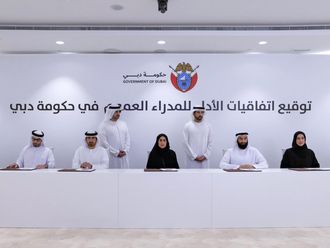Dubai: The Dubai Electricity and Water Authority (Dewa) and its partner agencies achieved their targets of reducing energy demand and rational use of power in 2015, resulting in savings of more than Dh60 million and minimising carbon emissions.
Saeed Mohammad Al Tayer, managing director and CEO of Dewa, made the announcement on Tuesday during the launch of the Demand Side Management (DSM) programme to be managed by Etihad ESCO within the framework of the Dubai Supreme Council of Energy.
The programme will provide internal consulting and management support to programme owners to address the relevant challenges needed to translate strategy into reality.
Shaikh Ahmad Bin Saeed Al Maktoum, Chairman of the Dubai Supreme Council of Energy, and Dr Thani Ahmad Al Zeyoudi, Minister of Climate Change and Environment, were present at the launch, along with other senior government officials.
The Dubai Supreme Council of Energy launched the Demand Side Management Strategy in June 2013. The Executive Committee of the Council is responsible for implementing it. The launch of the programme will ensure that this strategy will be fully transformed into reality.
“Demand side management and enhancing energy efficiency are major factors which have been adopted to develop an environment to reduce the carbon footprint per capita, making Dubai the city with the lowest carbon footprint in the world,” Al Tayer said.
“The strategy aims to reduce energy and water demand by 30 per cent by 2030. Demand Side Management focuses on reducing energy demand, the rational use of energy, and the adoption of best international techniques and practices to reduce the consumption of resources, by raising awareness about the practices and techniques to save energy and reduce costs,” he added.
The DSM strategy is built around nine core programmes that address every facet of our everyday life. These components are building regulations, building retrofits, district cooling, standards and labels for appliances and equipment, water reuse and efficient irrigation, outdoor lighting, demand response, and the Shams Dubai initiative to regulate the generation of solar energy in buildings.
“As of today, I am pleased to announce that 2015 saw the achievement of all targets previously mentioned. Most programmes enabled us to save money while transitioning from their pilot phase into more extensive phases of implementation,” Al Tayer said.
Government organisations in Dubai have audited energy use in their buildings while others have reviewed their use to assess opportunities for conservation and improve the efficiency of their electricity and water use, and define procedures to meet targets to decrease consumption by 20 per cent by 2020.
“All the public member companies of the Supreme Council of Energy put procedures in place to conserve energy consumption their buildings. These procedures resulted in saving 164 gigawatts (GW) of electricity, which equates to Dh62 million.”
“The Dubai Green Building Regulation Code has achieved remarkable results since its launch in March 2014. At Jebel Ali and Al Aweer power stations, Dewa replaced 8,500 indoor and outdoor lights with LED lights, at a cost of Dh20 million. The project will cut electricity use by about 70 per cent, which is equivalent to 14 gigawatt hours per year and Dh6 million annually, with the costs being recouped within three years.”
Dewa is currently working on retrofitting seven of its buildings at a total cost Dh15 million, which should save gigawatt hours of electricity per year. Costs will be redeemed within six years.
Dewa’s Shams Dubai initiative, which encourages residents to install solar panels on their rooftops, has also achieved outstanding results. So far, a total of 30 photovoltaic systems have been installed, six of them have been connected to Dubai’s electricity network.
The other government agencies that contributed to these gains are the Roads and Transport Authority, Dubai Municipality, Dubai Civil Aviation Authority, Emirates Authority for Standardisation and Metrology, Regulatory and Supervisory Bureau (RSB) for electricity and water in Dubai, Emirates National Oil Company (Enoc), among others.
“Looking at the future, our targets are becoming more ambitious. The challenges we face are those we must all join together to resolve. I believe that through collaboration and teamwork we can achieve our goals and make Dubai the world’s leading sustainable city, for us and for generations to come,” Al Tayer said.












